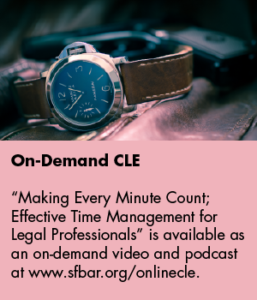“Organizing is what you do before you do something, so when you do it, it’s not all messed up.”
– Christopher Robin, Winnie the Pooh
000000
1.The Rule of Five: Do It Now
We often think, “I’ll get to that later.” But we don’t. Other things come up; distractions, etc. If it can be done in less than five minutes, just do it and get it off your desk. Ask yourself, “What’s the most effective use of my time right now?” Get it done, and you don’t have to think about it. Cross that one off your list.
2. Email: Create a Good (Short!) Subject Line
People pollucinate (pollute the communication) when emailing. 90 percent of communication is body language, relationship and trust; 10 percent is just words. With email, that 90 percent is missing. If more than two emails go back and forth with no closure, pick up the phone or walk down the hall and have a conversation.
The reality is most people only read the screen in front of them. They’re busy and won’t scroll down. What’s the most important thing? Put that in the subject and the first two lines.
3. Filing: Where Is Someone (Including You) Likely to Look?
We’ve all misplaced our car keys and wasted time looking for them – usually in a rush, when we need to get out the door. But if you pick one place – i.e., the counter next to the phone – and put them there every time, you will always find them.
Make sure that you have thought through where you would actually look for something as opposed to just filing it somewhere. Everything has a place, you know where you’re putting it, and everyone can find it when they need it.
4. Be Clear: No One Can Read Your Mind
Some attorneys think that they only need to give the briefest instruction, on a “need-to-know” basis. But when instructions are unclear or incomplete, the Rule of 10 applies. However long you think something should take, it usually takes ten times as long if you have to undo a mistake. Be specific. Describe the whole project. Provide clear direction, share information, make sure everyone understands what you need, and verify it.
After a meeting or instruction, send an email immediately, outlining your understanding of the assignment: “Let me clarify that you want me to search 300 documents for the word seepage; is that correct? Is there anything else I should look for?”
5. Just Say No: Create Realistic Expectations
We once did a study of how long it takes to transcribe a tape. Attorneys assumed that if it took ten minutes to dictate a letter, it should take ten minutes to transcribe. Not so. Generally, it takes four times the length of dictation to transcribe due to garbled dictation, interruptions, and carefulness. Again, getting things right the first time saves a lot of time.
Our responsibility is to create the right expectations. If you can’t get something done in a timely manner, say so. If you run into difficulties trying to get something done, let people know and communicate the estimated time of completion. And don’t agree to do something that you really don’t want to do. It’s ok not to give an explanation for those extra volunteer activities that create serious anxiety. “I’m sorry that I won’t be able to do that for you.”
Regina (Gina) Maciula is Executive Director at Wendel, Rosen, Black & Dean, the first law firm in history to be certified by a third party as a Green Business. She is a Certified Legal Manager (CLM) and a Senior Professional in Human Resource Management (SPHR-CA).



